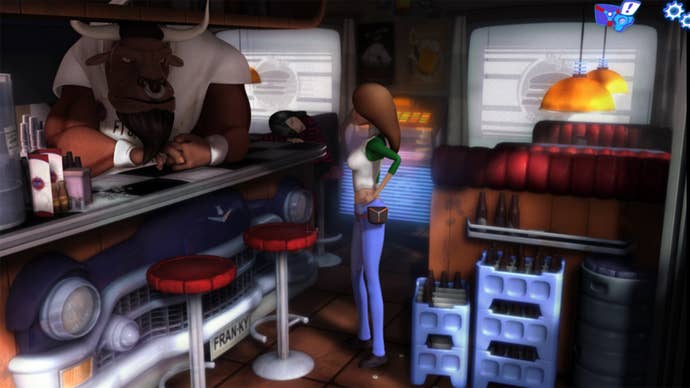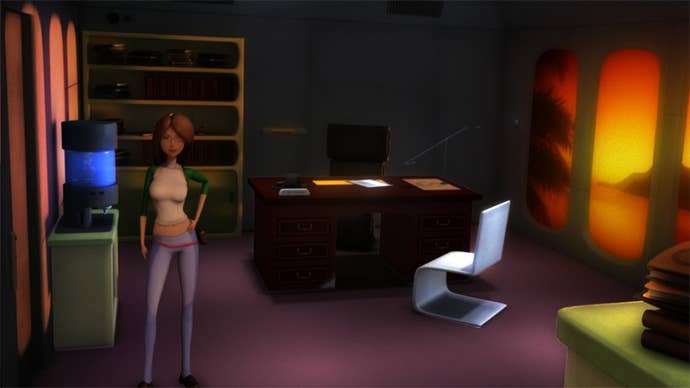AR-K Episode 1 PC Review: Orbital Decay
Developer Gato Salvaje delivers an attempt to recapture classic adventure game magic, and succeeds... at making you remember why these things have such a lousy reputation.
This article first appeared on USgamer, a partner publication of VG247. Some content, such as this article, has been migrated to VG247 for posterity after USgamer's closure - but it has not been edited or further vetted by the VG247 team.
Every time I hear people dismiss adventure games using dated references to syrupy cat hair mustaches, I bristle.
I mean, haven't they seen the great work Telltale's done in the past decade? How about Double Fine's Broken Age? Even recent games produced by folks who never set foot inside LucasArts, like Valiant Hearts and Stick it to the Man, managed to capture that classic adventure charm in a format highly accessible to modern gamers.
The lesson to be learned? Adventure games earned their infamous reputation because most of them just weren't very good. For every Monkey Island and Gabriel Knight in the world, dozens of awful others exist, largely forgotten outside of their current-day presence on abandonware sites. And the same holds true for this decade, as it did in the '90s: Just as developers have transformed adventure games into different-but-wonderful beasts, experiences like AR-K Episode 1 exist as a reminder of why everyone hated them in the first place.

It only takes three short hours, but AR-K Episode 1 exhibits every poor choice an adventure game could possibly make—and this realization didn't take much analysis outside of my own Bullshit Puzzle Detector. Here's how it works: If I'm stumped in an adventure game and can't make any progress, I turn to an FAQ. If the solution is something I missed due to my own lack of attentiveness, I feel like a dope, and use this newly gained information to clue me into how the game telegraphs its puzzles. If there's simply no way I could have known the solution without establishing a personal psychic link with the game designer, I can safely cheat without feeling even the slightest tinge of guilt.
That said, I played through the majority of AR-K Episode 1 guilt-free, with a FAQ open and no psychic powers to speak of. Simply put, AR-K has some of the most unintuitive puzzles I've ever encountered in an adventure game, and I've played a lot of them. The underlying issue lies in the fact that only AR-K's designers can connect the logical links from the beginning to the end of any puzzle—both you and the protagonist are left out of the loop entirely. Your goals are clear from the outset, but the machinations you go through to achieve them feel more like free association than procedural problem-solving.
Here's a good example: At some point in AR-K, you'll need to get a cup of coffee. And hey—there's a coffee machine in the university lobby! But when you try to use it, your character only offers a description of said machine. Later, when you need to get a coffee-obsessed professor to leave his office, you smash the machine with a brick (instead of just unplugging it or something) so he's forced to find his fix elsewhere. Then, to get coffee for yourself, you pick up one of the styrofoam cups freshly scattered on the floor, and use it on the machine. If this seems entirely too convoluted, here are a few more wrinkles: Why did the professor leave if the machine is clearly still functioning? And why can't you just get coffee from the local bar, where he retreats for a fresh cup because he assumes the machine is broken? AR-K only wants you to solve its puzzles in the most Byzantine manner possible, and makes no attempt to explain why the most obvious solution is impossible to try.
AR-K's dodgy UI makes its illogical puzzles even harder to solve, as it doesn't provide the information 99.9% of all adventure games typically do. Once you pick up an item, AR-K offers no way to examine it for a title or description. This might not seem like the biggest deal when these objects are represented by graphical icons, but the game seems to have engineered its puzzles with the belligerent UI in mind. At some point in the game, you'll end up with three differently colored soda cans, each with a unique use—forget how their contents differ, and, later in the game, you'll have no choice but to randomly mash inventory items together for the sake of progress. And to make things worse, simply using items in your inventory is a pain: You drag them out of a menu and onto things in the environment, but it's never really clear as to whether the game knows you intend to use one thing on another. At one point I assumed I had a puzzle all wrong because I didn't drag the item in question over the specific, unmarked area that would allow me to give it to a another character.

You'll notice I didn't say much about AR-K's story—that's because there isn't much of one. The game presents an irritating Mary Sue protagonist and tries its best to make her appealing, but you can only do so much with a character who ends sentences with "...NOT!" without a hint of irony. AR-K won some points with me from the beginning by including a female main character, but she carries an unhealthy dose of leering sexism that goes beyond her heaving Double-Ds and electron-thin skinny jeans. And the developers make no effort to explain anything about the world they crafted, even though the futuristic space station doesn't look too different from our own existence, outside of some Jetson-y touches. Where are we? When are we? Did someone actually think this story needed to be told? The mysteries of AR-K are entirely unintentional.
I have to admit, it feels a little dirty to trash a Kickstarter game. Then again, when you charge $10 for a product, you open yourself up to scrutiny. And it's not like great adventure games can't be made with little money: Kentucky Route Zero is a fantastic example. Hell, Phoenix Wright burned through three games using the same lo-fi background art and canned character animations, and it still managed to develop a healthy cult following. Gato Salvaje obviously didn't set out to make a lousy game, but about halfway through AR-K Episode 1, I wanted to buy a ticket to Spain, find these people, shake them, and yell "WHERE HAVE YOU BEEN FOR THE LAST DECADE!?" It's admirable these developers aspired to create a classic adventure game, but that doesn't mean they had to pretend it was 1996.
VisualsAR-K's mostly static backgrounds look nice, but the choice of awkward pre-rendered sprites for characters makes the cast more than a little tough to look at.
SoundThe music is barely there, and when it is, it's hardly noticeable. On top of that, low-effort line readings will have you itching to skip the spoken dialogue.
InterfaceAR-K's UI simply provides an additional level of unfriendliness to compliment the unfriendly puzzles. Even the simplest commands can be difficult to pull off.
Lasting AppealIn this first episode, AR-K tries to present a compelling mystery, but fails to communicate why any of its narrative should feel significant. But even if the dangling plot threads grab you, the obnoxious main character tries her best to push you away.
ConclusionIf you need to know why gamers collectively turned up their noses at adventure games in the late '90s, look no further than AR-K: It contains every design flaw we washed our hands of 15 years ago. It's hard to tell if Gato Salvaje has played an adventure game since this fabled era, but if they want to save Episode 2 of AR-K, they'd better start.
